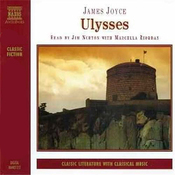
That James Joyce and his final paragraphs. I have to hand it to the man, he sure knew how to end a book. The final passage of Ulysses is justly famous for Molly Bloom's orgasmic "Yes I said Yes I will Yes," but it's possible that the somnolent incantation of snow-blanketed Ireland in the final pages of The Dead is just as strong, with its repetitions and inversions ("falling softly"/"softly falling") and its vast but muted vistas. It's certainly one of those passages, like Mrs. Dalloway's "What a lark! What a plunge!" or The Unnamable's "I can't go on, I'll go on," whose echoes I hear in my head on a regular basis, triggered by a fragment of casual conversation, an everyday action, or another written phrase:
It had begun to snow again. He watched sleepily the flakes, silver and dark, falling obliquely against the lamplight. The time had come for him to set out on his journey westward. Yes, the newspapers were right: the snow was general all over Ireland. It was falling on every part of the dark central plain, on the treeless hills, falling softly upon the Bog of Allen and, farther westward, softly falling into the dark mutinous Shannon waves. It was falling, too, upon every part of the lonely churchyard on the hill where Michael Fury lay buried. It lay thickly drifted on the crooked crosses and headstones, on the spears of the little gate, on the barren thorns. His soul swooned slowly as he heard the snow falling faintly through the universe and faintly falling, like the descent of their last end, upon all the living and the dead.
Thus Gabriel Conroy, would-be cosmopolitan and darling of his elderly aunts, drifts off to sleep after attending the aunts' annual Epiphany dance. Having tipped the caretaker's daughter, gotten into an awkward conversation with a nationalist colleague, expertly carved the goose, and made a speech, he then leaves the party and experiences an attack of longing for his wife, only to find out a long-kept secret about her youthful past. This time through, I was surprised that most of what I remember as powerful, including Gabriel's lust for Gretta, her story and his pre-sleep musing—happens in the final fifth of the novella, with the rest being devoted to the Epiphany party. Bibliographing Nicole had a similar trick of memory, which sounds maybe more extreme than mine.
Knowing what was coming, it was interesting to re-read the long party section for elucidation of what comes later. Gabriel, for example, though the golden nephew in his aunts' eyes, is several times severely discomfited when women challenge him, or react to his pleasantries differently than he expects. The caretaker's daughter Lily makes an unexpectedly dark comment about men in response to Gabriel's teasing, and Gabriel "coloured as if he felt he had made a mistake," awkwardly making amends by slipping her a coin. Later on, he's similarly ill at ease when his colleague Miss Ivors confronts him for having (in her eyes) insufficient pride in his Irish heritage—deciding to alter his annual speech out of deference to her. In fact, he spends a good deal of the party worrying about his speech, about whether it will come off conceited or whether he will alienate his audience if he quotes poetry too sophisticated for their palates. Like Stephen Dedalus after him, Gabriel is too self-conscious to feel natural in his own skin most of the time. Even his yearning for Gretta late in the book is beset by similarly uncertain moments, intermixed with a powerful warmth of memory and strength of desire. This makes her final revelation, which seems to exclude him from an important part of her inner life, that much more of a blow—for Gabriel, if not for the reader.
And indeed, I was thinking throughout this reading of a debate I got into in a British Modernism class once, about whether Gretta's sadness at remembering the death of her young lover actually does invalidate somehow the years of warmth and memories that Gabriel is remembering just before she tells him the story:
Moments of their secret life together burst like stars upon his memory. A heliotrope envelope was lying beside his breakfast-cup and he was caressing it with his hand. Birds were twittering in the ivy and the sunny web of the curtain was shimmering along the floor: he could not eat for happiness. They were standing on the crowded platform and he was placing a ticket inside the warm palm of his glove. He was standing with her in the cold, looking in through a grated window at a man making bottles in a roaring furnace...
At the time, I felt very strongly that a single tragic incident from Gretta's past does not "trump" the years of quotidian connection between husband and wife, however jarring it might be for Gabriel to hear his wife's story when he is in such a different mood. My own prejudice remains one that would privilege Gabriel's stockpile of seemingly mundane shared experiences over a more Romantic tragic love story. Now that I'm less invested in the idea that Joyce must necessarily be expressing my own feelings, though, I can see both sides. To take my original position, we are not presented with an incompatible or unhappy couple. Gretta's gentle ribbing of Gabriel as they arrive at the party, about the care he takes of their children and the way he makes her wear galoshes to keep her from getting a cold, makes clear their mutual affection. So too, Gabriel's indignant thoughts when he remembers that his mother never quite approved of Gretta, and always thought that he married slightly beneath him, would vouch for the store he sets by her even if his later lustiness did not. So it still seems to me that this is a portrait of one melancholic night in a more or less successful marriage—or, more generally, of the way in which we can never achieve complete knowledge of another person, even if we are close to them—rather than a picture of an unhappy woman putting on a brave face as she secretly pines away for her lost lover.
Still, Gabriel definitely has his self-deluding moments, in large part due to his insecurity. He is cold with Gretta when she says she would love to see Galway again, because he has just been made to feel uncomfortable by Miss Ivors and he doesn't want to hear enthusiasm for Miss Ivors's plans. He's unable to access Gretta's own excitement, and it's only when he sees his wife look melancholy and romantic that he feels the desire to reconnect with her. Even then, his desire takes a kind of scripted form: he wants to "defend her against something and then to be alone with her"; or to spirit her away to a never-never land far from their daily commitments. Perhaps some of his devastation at hearing the tale of Michael Furey speaks to his own investment in Romantic tropes like that of the of gallant male savior and damsel in distress, or that of the great tragic love that ends in death. Although Joyce's own commitment to these tropes might be significantly less (and given Ulysses it's hard to think differently), his portrayal of Gabriel's disillusionment is still affecting.
Revisiting that closing paragraph, I was struck by the odd-seeming sentence, "The time had come for him to set out on his journey westward." I hadn't remembered it, I'm still not clear exactly what it's doing there. It seems, in the context of the novella's title and Gabriel's mood, imbued with intimations of mortality, as if traveling west would be synonymous with starting down the road toward death. (Possibly this is backed by religious and/or mythic traditions of which I'm not aware?) Alternately, it could tie in with the scene in which Miss Ivors proposes that Gabriel and Gretta come with her on a trip to the Aran Islands, which are in the far West of Ireland (as opposed to the eastern-situated Dublin, where the action is taking place). Gabriel, would-be man of the world, prefers to take his holidays on the Continent, in France or Germany. In a subsequent conversation with Gretta, as noted above, she's more enthusiastic than Gabriel about visiting western Ireland, as she would "love to see Galway again"—the city in which she lived during her youth. Thus western Ireland is presented as particularly Irish, being both the favored destination of the nationalist Miss Ivors and the hometown of the slightly earthy Gretta. Perhaps Gabriel's journey "westward" is one of coming to terms with the Irishness he has been trying to escape, in addition to a journey in imagination back to the site of his wife's youthful tragedy.
Notes on Disgust
(for more information on the disgust project, see here)
Since I've started the disgust project, this is the first thing I've read in which I neither felt any disgust while reading, or noticed any characters feeling disgust. A disgust-free read, unless I'm missing something, for those who aren't as fascinated by the disgusting as I am!
I re-read The Dead as part of Frances's Art of the Novella Challenge. It's the fourth of six novellas from Melville House's Art of the Novella series that I hope to read over the course of August.
This novella was consumed in a sleeping bag on a camping trip, and alas, no beverages accompanied it. Given Gabriel's long pulls on a dark Irish porter during the party, however, I can only suggest that a pint of Guinness is the obvious choice here.


